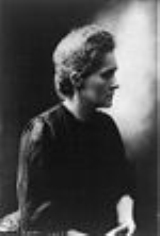
Female Nobel Prize laureates
Encyclopedia
The Nobel Prize
s are awarded annually by the Royal Swedish Academy of Sciences
, the Swedish Academy
, the Karolinska Institute
, and the Norwegian Nobel Committee
to individuals who make outstanding contributions in the fields of Chemistry
, Physics
, Literature
, Peace
, Physiology or Medicine
and Economics. All but the economics prize were established by the 1895 will of Alfred Nobel
, which dictates that the awards should be administered by the Nobel Foundation
. The Nobel prize in Economics, or The Sveriges Riksbank Prize in Economic Sciences in Memory of Alfred Nobel, was established in 1968 by the Sveriges Riksbank
, the central bank
of Sweden
, for outstanding contributions in the field of Economics. Each prize is awarded by a separate committee; the Royal Swedish Academy of Sciences awards the Prizes in Physics, Chemistry, and Economics, the Swedish Academy awards the Prize in Literature, the Karolinska Institute awards the Prize in Physiology or Medicine, and the Norwegian Nobel Committee awards the Prize in Peace. Each recipient receives a medal, a diploma and a cash prize that has varied throughout the years. In 1901, the winners of the first Nobel Prizes were given 150,782 SEK
, which is equal to 7,731,004 SEK in December 2007. In 2008, the winners were awarded a prize amount of 10,000,000 SEK. The awards are presented in Stockholm
(Physics, Chemistry, Physiology or Medicine, Literature and Economics) and Oslo
(Peace) in an annual ceremony on December 10, the anniversary
of Nobel's death.
Following the awards of 2011 (other than the 2011 Economics Prize), the Nobel Prize has been awarded 807 times to men and 44 times to women (there have also been 23 awards to organizations). The first woman to win a Nobel Prize was Marie Curie
, who won the Nobel Prize in Physics in 1903 with her husband, Pierre Curie
, and Henri Becquerel
. Curie is also the only woman to have won multiple Nobel Prizes; in 1911, she won the Nobel Prize in Chemistry (and is accordingly included twice in the total figure of 44 for female laureates). Curie's daughter, Irène Joliot-Curie
, won the Nobel Prize in Chemistry in 1935, making the two the only mother-daughter pair to have won Nobel Prizes. Fifteen women have won the Nobel Peace Prize, twelve have won the Nobel Prize in Literature, ten have won the Nobel Prize in Physiology or Medicine, four have won the Nobel Prize in Chemistry, two have won the Nobel Prize in Physics and only one woman (in 2009) has won the Nobel Memorial Prize in Economic Sciences. The most Nobel Prizes awarded to women in a single year was in 2009, when five women became laureates.
Nobel Prize
The Nobel Prizes are annual international awards bestowed by Scandinavian committees in recognition of cultural and scientific advances. The will of the Swedish chemist Alfred Nobel, the inventor of dynamite, established the prizes in 1895...
s are awarded annually by the Royal Swedish Academy of Sciences
Royal Swedish Academy of Sciences
The Royal Swedish Academy of Sciences or Kungliga Vetenskapsakademien is one of the Royal Academies of Sweden. The Academy is an independent, non-governmental scientific organization which acts to promote the sciences, primarily the natural sciences and mathematics.The Academy was founded on 2...
, the Swedish Academy
Swedish Academy
The Swedish Academy , founded in 1786 by King Gustav III, is one of the Royal Academies of Sweden.-History:The Swedish Academy was founded in 1786 by King Gustav III. Modelled after the Académie française, it has 18 members. The motto of the Academy is "Talent and Taste"...
, the Karolinska Institute
Karolinska Institutet
Karolinska institutet is a medical university in Solna within the Stockholm urban area, Sweden, and one of Europe's largest medical universities...
, and the Norwegian Nobel Committee
Norwegian Nobel Committee
The Norwegian Nobel Committee awards the Nobel Peace Prize each year.Its five members are appointed by the Norwegian Parliament and roughly represent the political makeup of that body.-History:...
to individuals who make outstanding contributions in the fields of Chemistry
Nobel Prize in Chemistry
The Nobel Prize in Chemistry is awarded annually by the Royal Swedish Academy of Sciences to scientists in the various fields of chemistry. It is one of the five Nobel Prizes established by the will of Alfred Nobel in 1895, awarded for outstanding contributions in chemistry, physics, literature,...
, Physics
Nobel Prize in Physics
The Nobel Prize in Physics is awarded once a year by the Royal Swedish Academy of Sciences. It is one of the five Nobel Prizes established by the will of Alfred Nobel in 1895 and awarded since 1901; the others are the Nobel Prize in Chemistry, Nobel Prize in Literature, Nobel Peace Prize, and...
, Literature
Nobel Prize in Literature
Since 1901, the Nobel Prize in Literature has been awarded annually to an author from any country who has, in the words from the will of Alfred Nobel, produced "in the field of literature the most outstanding work in an ideal direction"...
, Peace
Nobel Peace Prize
The Nobel Peace Prize is one of the five Nobel Prizes bequeathed by the Swedish industrialist and inventor Alfred Nobel.-Background:According to Nobel's will, the Peace Prize shall be awarded to the person who...
, Physiology or Medicine
Nobel Prize in Physiology or Medicine
The Nobel Prize in Physiology or Medicine administered by the Nobel Foundation, is awarded once a year for outstanding discoveries in the field of life science and medicine. It is one of five Nobel Prizes established in 1895 by Swedish chemist Alfred Nobel, the inventor of dynamite, in his will...
and Economics. All but the economics prize were established by the 1895 will of Alfred Nobel
Alfred Nobel
Alfred Bernhard Nobel was a Swedish chemist, engineer, innovator, and armaments manufacturer. He is the inventor of dynamite. Nobel also owned Bofors, which he had redirected from its previous role as primarily an iron and steel producer to a major manufacturer of cannon and other armaments...
, which dictates that the awards should be administered by the Nobel Foundation
Nobel Foundation
The Nobel Foundation is a private institution founded on 29 June 1900 to manage the finances and administration of the Nobel Prizes. The Foundation is based on the last will of Alfred Nobel, the inventor of dynamite....
. The Nobel prize in Economics, or The Sveriges Riksbank Prize in Economic Sciences in Memory of Alfred Nobel, was established in 1968 by the Sveriges Riksbank
Sveriges Riksbank
Sveriges Riksbank, or simply Riksbanken, is the central bank of Sweden and the world's oldest central bank. It is sometimes called the Swedish National Bank or the Bank of Sweden .-History:...
, the central bank
Central bank
A central bank, reserve bank, or monetary authority is a public institution that usually issues the currency, regulates the money supply, and controls the interest rates in a country. Central banks often also oversee the commercial banking system of their respective countries...
of Sweden
Sweden
Sweden , officially the Kingdom of Sweden , is a Nordic country on the Scandinavian Peninsula in Northern Europe. Sweden borders with Norway and Finland and is connected to Denmark by a bridge-tunnel across the Öresund....
, for outstanding contributions in the field of Economics. Each prize is awarded by a separate committee; the Royal Swedish Academy of Sciences awards the Prizes in Physics, Chemistry, and Economics, the Swedish Academy awards the Prize in Literature, the Karolinska Institute awards the Prize in Physiology or Medicine, and the Norwegian Nobel Committee awards the Prize in Peace. Each recipient receives a medal, a diploma and a cash prize that has varied throughout the years. In 1901, the winners of the first Nobel Prizes were given 150,782 SEK
Swedish krona
The krona has been the currency of Sweden since 1873. Both the ISO code "SEK" and currency sign "kr" are in common use; the former precedes or follows the value, the latter usually follows it, but especially in the past, it sometimes preceded the value...
, which is equal to 7,731,004 SEK in December 2007. In 2008, the winners were awarded a prize amount of 10,000,000 SEK. The awards are presented in Stockholm
Stockholm
Stockholm is the capital and the largest city of Sweden and constitutes the most populated urban area in Scandinavia. Stockholm is the most populous city in Sweden, with a population of 851,155 in the municipality , 1.37 million in the urban area , and around 2.1 million in the metropolitan area...
(Physics, Chemistry, Physiology or Medicine, Literature and Economics) and Oslo
Oslo
Oslo is a municipality, as well as the capital and most populous city in Norway. As a municipality , it was established on 1 January 1838. Founded around 1048 by King Harald III of Norway, the city was largely destroyed by fire in 1624. The city was moved under the reign of Denmark–Norway's King...
(Peace) in an annual ceremony on December 10, the anniversary
Anniversary
An anniversary is a day that commemorates or celebrates a past event that occurred on the same day of the year as the initial event. For example, the first event is the initial occurrence or, if planned, the inaugural of the event. One year later would be the first anniversary of that event...
of Nobel's death.
Following the awards of 2011 (other than the 2011 Economics Prize), the Nobel Prize has been awarded 807 times to men and 44 times to women (there have also been 23 awards to organizations). The first woman to win a Nobel Prize was Marie Curie
Marie Curie
Marie Skłodowska-Curie was a physicist and chemist famous for her pioneering research on radioactivity. She was the first person honored with two Nobel Prizes—in physics and chemistry...
, who won the Nobel Prize in Physics in 1903 with her husband, Pierre Curie
Pierre Curie
Pierre Curie was a French physicist, a pioneer in crystallography, magnetism, piezoelectricity and radioactivity, and Nobel laureate. He was the son of Dr. Eugène Curie and Sophie-Claire Depouilly Curie ...
, and Henri Becquerel
Henri Becquerel
Antoine Henri Becquerel was a French physicist, Nobel laureate, and the discoverer of radioactivity along with Marie Curie and Pierre Curie, for which all three won the 1903 Nobel Prize in Physics.-Early life:...
. Curie is also the only woman to have won multiple Nobel Prizes; in 1911, she won the Nobel Prize in Chemistry (and is accordingly included twice in the total figure of 44 for female laureates). Curie's daughter, Irène Joliot-Curie
Irène Joliot-Curie
Irène Joliot-Curie was a French scientist, the daughter of Marie Skłodowska-Curie and Pierre Curie and the wife of Frédéric Joliot-Curie. Jointly with her husband, Joliot-Curie was awarded the Nobel Prize for chemistry in 1935 for their discovery of artificial radioactivity. This made the Curies...
, won the Nobel Prize in Chemistry in 1935, making the two the only mother-daughter pair to have won Nobel Prizes. Fifteen women have won the Nobel Peace Prize, twelve have won the Nobel Prize in Literature, ten have won the Nobel Prize in Physiology or Medicine, four have won the Nobel Prize in Chemistry, two have won the Nobel Prize in Physics and only one woman (in 2009) has won the Nobel Memorial Prize in Economic Sciences. The most Nobel Prizes awarded to women in a single year was in 2009, when five women became laureates.
Laureates
| Year | | Image | Laureate | Country | Category | Rationale |
|---|---|---|---|---|---|
| 1903 |  |
(shared with Pierre Curie Pierre Curie Pierre Curie was a French physicist, a pioneer in crystallography, magnetism, piezoelectricity and radioactivity, and Nobel laureate. He was the son of Dr. Eugène Curie and Sophie-Claire Depouilly Curie ... and Henri Becquerel Henri Becquerel Antoine Henri Becquerel was a French physicist, Nobel laureate, and the discoverer of radioactivity along with Marie Curie and Pierre Curie, for which all three won the 1903 Nobel Prize in Physics.-Early life:... ) |
Poland Poland Poland , officially the Republic of Poland , is a country in Central Europe bordered by Germany to the west; the Czech Republic and Slovakia to the south; Ukraine, Belarus and Lithuania to the east; and the Baltic Sea and Kaliningrad Oblast, a Russian exclave, to the north... and France France The French Republic , The French Republic , The French Republic , (commonly known as France , is a unitary semi-presidential republic in Western Europe with several overseas territories and islands located on other continents and in the Indian, Pacific, and Atlantic oceans. Metropolitan France... |
Physics Nobel Prize in Physics The Nobel Prize in Physics is awarded once a year by the Royal Swedish Academy of Sciences. It is one of the five Nobel Prizes established by the will of Alfred Nobel in 1895 and awarded since 1901; the others are the Nobel Prize in Chemistry, Nobel Prize in Literature, Nobel Peace Prize, and... |
"in recognition of the extraordinary services they have rendered by their joint researches on the radiation phenomena discovered by Professor Henri Becquerel Henri Becquerel Antoine Henri Becquerel was a French physicist, Nobel laureate, and the discoverer of radioactivity along with Marie Curie and Pierre Curie, for which all three won the 1903 Nobel Prize in Physics.-Early life:... " |
| 1905 |  |
Austria–Hungary | Peace Nobel Peace Prize The Nobel Peace Prize is one of the five Nobel Prizes bequeathed by the Swedish industrialist and inventor Alfred Nobel.-Background:According to Nobel's will, the Peace Prize shall be awarded to the person who... |
Honourary President of Permanent International Peace Bureau International Peace Bureau International Peace Bureau is the world's oldest international peace federation. It was founded in 1891, and awarded the Nobel Peace Prize in 1910.... , Bern, Switzerland Switzerland Switzerland name of one of the Swiss cantons. ; ; ; or ), in its full name the Swiss Confederation , is a federal republic consisting of 26 cantons, with Bern as the seat of the federal authorities. The country is situated in Western Europe,Or Central Europe depending on the definition.... ; Author of Lay Down Your Arms. |
|
| 1909 | ,_painted_by_carl_larsson.jpg) |
Sweden Sweden Sweden , officially the Kingdom of Sweden , is a Nordic country on the Scandinavian Peninsula in Northern Europe. Sweden borders with Norway and Finland and is connected to Denmark by a bridge-tunnel across the Öresund.... |
Literature Nobel Prize in Literature Since 1901, the Nobel Prize in Literature has been awarded annually to an author from any country who has, in the words from the will of Alfred Nobel, produced "in the field of literature the most outstanding work in an ideal direction"... |
"in appreciation of the lofty idealism, vivid imagination and spiritual perception that characterize her writings" | |
| 1911 |  |
Poland Poland Poland , officially the Republic of Poland , is a country in Central Europe bordered by Germany to the west; the Czech Republic and Slovakia to the south; Ukraine, Belarus and Lithuania to the east; and the Baltic Sea and Kaliningrad Oblast, a Russian exclave, to the north... and France France The French Republic , The French Republic , The French Republic , (commonly known as France , is a unitary semi-presidential republic in Western Europe with several overseas territories and islands located on other continents and in the Indian, Pacific, and Atlantic oceans. Metropolitan France... |
Chemistry Nobel Prize in Chemistry The Nobel Prize in Chemistry is awarded annually by the Royal Swedish Academy of Sciences to scientists in the various fields of chemistry. It is one of the five Nobel Prizes established by the will of Alfred Nobel in 1895, awarded for outstanding contributions in chemistry, physics, literature,... |
"for her discovery of radium Radium Radium is a chemical element with atomic number 88, represented by the symbol Ra. Radium is an almost pure-white alkaline earth metal, but it readily oxidizes on exposure to air, becoming black in color. All isotopes of radium are highly radioactive, with the most stable isotope being radium-226,... and polonium Polonium Polonium is a chemical element with the symbol Po and atomic number 84, discovered in 1898 by Marie Skłodowska-Curie and Pierre Curie. A rare and highly radioactive element, polonium is chemically similar to bismuth and tellurium, and it occurs in uranium ores. Polonium has been studied for... " |
|
| 1926 |  |
Italy Italy Italy , officially the Italian Republic languages]] under the European Charter for Regional or Minority Languages. In each of these, Italy's official name is as follows:;;;;;;;;), is a unitary parliamentary republic in South-Central Europe. To the north it borders France, Switzerland, Austria and... |
Literature | "for her idealistically inspired writings which with plastic clarity picture the life on her native island and with depth and sympathy deal with human problems in general" | |
| 1928 | 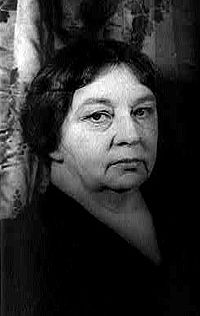 |
Norway Norway Norway , officially the Kingdom of Norway, is a Nordic unitary constitutional monarchy whose territory comprises the western portion of the Scandinavian Peninsula, Jan Mayen, and the Arctic archipelago of Svalbard and Bouvet Island. Norway has a total area of and a population of about 4.9 million... |
Literature | "principally for her powerful descriptions of Northern life during the Middle Ages" | |
| 1931 | 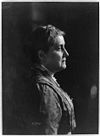 |
(shared with Nicholas Murray Butler) |
United States United States The United States of America is a federal constitutional republic comprising fifty states and a federal district... |
Peace | Sociologist; International President, Women's International League for Peace and Freedom Women's International League for Peace and Freedom The Women's International League for Peace and Freedom was established in the United States in January 1915 as the Woman's Peace Party... . |
| 1935 | (shared with Frédéric Joliot-Curie Frédéric Joliot-Curie Jean Frédéric Joliot-Curie , born Jean Frédéric Joliot, was a French physicist and Nobel laureate.-Early years:... ) |
France France The French Republic , The French Republic , The French Republic , (commonly known as France , is a unitary semi-presidential republic in Western Europe with several overseas territories and islands located on other continents and in the Indian, Pacific, and Atlantic oceans. Metropolitan France... |
Chemistry | "for their synthesis of new radioactive Radionuclide A radionuclide is an atom with an unstable nucleus, which is a nucleus characterized by excess energy available to be imparted either to a newly created radiation particle within the nucleus or to an atomic electron. The radionuclide, in this process, undergoes radioactive decay, and emits gamma... elements" |
|
| 1938 |  |
United States United States The United States of America is a federal constitutional republic comprising fifty states and a federal district... |
Literature | "for her rich and truly epic descriptions of peasant life in China and for her biographical masterpieces" | |
| 1945 | .jpg) |
Chile Chile Chile ,officially the Republic of Chile , is a country in South America occupying a long, narrow coastal strip between the Andes mountains to the east and the Pacific Ocean to the west. It borders Peru to the north, Bolivia to the northeast, Argentina to the east, and the Drake Passage in the far... |
Literature | "for her lyric poetry which, inspired by powerful emotions, has made her name a symbol of the idealistic aspirations of the entire Latin American world" | |
| 1946 |  |
(shared with John Raleigh Mott John Mott John Raleigh Mott was a long-serving leader of the YMCA and the World Student Christian Federation... ) |
United States United States The United States of America is a federal constitutional republic comprising fifty states and a federal district... |
Peace | Formerly Professor of History and Sociology; Honorary International President, Women's International League for Peace and Freedom. |
| 1947 |  |
(shared with Carl Ferdinand Cori Carl Ferdinand Cori Carl Ferdinand Cori was a Czech biochemist and pharmacologist born in Prague who, together with his wife Gerty Cori and Argentine physiologist Bernardo Houssay, received a Nobel Prize in 1947 for their discovery of how glycogen – a derivative of glucose – is broken down and... and Bernardo Houssay Bernardo Houssay -External links:* * . WhoNamedIt.* . Nobel Foundation.... ) |
United States United States The United States of America is a federal constitutional republic comprising fifty states and a federal district... |
Physiology or Medicine Nobel Prize in Physiology or Medicine The Nobel Prize in Physiology or Medicine administered by the Nobel Foundation, is awarded once a year for outstanding discoveries in the field of life science and medicine. It is one of five Nobel Prizes established in 1895 by Swedish chemist Alfred Nobel, the inventor of dynamite, in his will... |
"for their discovery of the course of the catalytic conversion of glycogen Glycogen Glycogen is a molecule that serves as the secondary long-term energy storage in animal and fungal cells, with the primary energy stores being held in adipose tissue... " |
| 1963 | 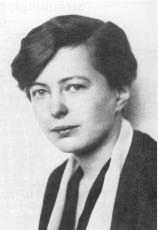 |
(shared with J. Hans D. Jensen J. Hans D. Jensen Johannes Hans Daniel Jensen was a German nuclear physicist. During World War II, he worked on the German nuclear energy project, known as the Uranium Club, in which he made contributions to the separation of uranium isotopes. After the war Jensen was a professor at the University of Heidelberg... and Eugene Wigner) |
United States United States The United States of America is a federal constitutional republic comprising fifty states and a federal district... |
Physics | "for their discoveries concerning nuclear shell structure" |
| 1964 | United Kingdom United Kingdom The United Kingdom of Great Britain and Northern IrelandIn the United Kingdom and Dependencies, other languages have been officially recognised as legitimate autochthonous languages under the European Charter for Regional or Minority Languages... |
Chemistry | "for her determinations by X-ray techniques Crystallography Crystallography is the experimental science of the arrangement of atoms in solids. The word "crystallography" derives from the Greek words crystallon = cold drop / frozen drop, with its meaning extending to all solids with some degree of transparency, and grapho = write.Before the development of... of the structures of important biochemical substances" |
||
| 1966 | (shared with Samuel Agnon) |
Sweden Sweden Sweden , officially the Kingdom of Sweden , is a Nordic country on the Scandinavian Peninsula in Northern Europe. Sweden borders with Norway and Finland and is connected to Denmark by a bridge-tunnel across the Öresund.... and Germany Germany Germany , officially the Federal Republic of Germany , is a federal parliamentary republic in Europe. The country consists of 16 states while the capital and largest city is Berlin. Germany covers an area of 357,021 km2 and has a largely temperate seasonal climate... |
Literature | "for her outstanding lyrical and dramatic writing, which interprets Israel's destiny with touching strength" | |
| 1976 | 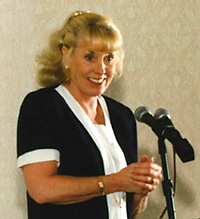 |
United Kingdom United Kingdom The United Kingdom of Great Britain and Northern IrelandIn the United Kingdom and Dependencies, other languages have been officially recognised as legitimate autochthonous languages under the European Charter for Regional or Minority Languages... |
Peace | Founder of the Northern Ireland Peace Movement (later renamed Community of Peace People) | |
| 1976 | United Kingdom United Kingdom The United Kingdom of Great Britain and Northern IrelandIn the United Kingdom and Dependencies, other languages have been officially recognised as legitimate autochthonous languages under the European Charter for Regional or Minority Languages... |
Peace | Founder of the Northern Ireland Peace Movement (later renamed Community of Peace People) | ||
| 1977 | (shared with Roger Guillemin Roger Guillemin Roger Charles Louis Guillemin received the National Medal of Science in 1976, and the Nobel prize for medicine in 1977 for his work on neurohormones, sharing the prize that year with Andrew Schally and Rosalyn Sussman Yalow.Completing his undergraduate work at the University of Burgundy, Guillemin... and Andrew Schally) |
United States United States The United States of America is a federal constitutional republic comprising fifty states and a federal district... |
Physiology or Medicine | "for the development of radioimmunoassay Radioimmunoassay Radioimmunoassay is a very sensitive in vitro assay technique used to measure concentrations of antigens by use of antibodies... s of peptide hormone Peptide hormone Peptide hormones are a class of peptides that are secreted into the blood stream and have endocrine functions in living animals.Like other proteins, peptide hormones are synthesized in cells from amino acids according to an mRNA template, which is itself synthesized from a DNA template inside the... s" |
|
| 1979 | 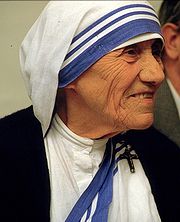 |
India India India , officially the Republic of India , is a country in South Asia. It is the seventh-largest country by geographical area, the second-most populous country with over 1.2 billion people, and the most populous democracy in the world... and Macedonia Republic of Macedonia Macedonia , officially the Republic of Macedonia , is a country located in the central Balkan peninsula in Southeast Europe. It is one of the successor states of the former Yugoslavia, from which it declared independence in 1991... |
Peace | Leader of Missionaries of Charity Missionaries of Charity Missionaries of Charity is a Roman Catholic religious congregation established in 1950 by Mother Teresa of Calcutta, which consists of over 4,500 sisters and is active in 133 countries... , Calcutta Kolkata Kolkata , formerly known as Calcutta, is the capital of the Indian state of West Bengal. Located on the east bank of the Hooghly River, it was the commercial capital of East India... . |
|
| 1982 | 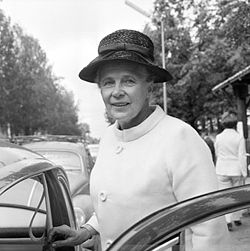 |
(shared with Alfonso García Robles Alfonso García Robles Alfonso García Robles was a Mexican diplomat and politician who, in conjunction with Sweden's Alva Myrdal, received the Nobel Peace Prize in 1982.... ) |
Sweden Sweden Sweden , officially the Kingdom of Sweden , is a Nordic country on the Scandinavian Peninsula in Northern Europe. Sweden borders with Norway and Finland and is connected to Denmark by a bridge-tunnel across the Öresund.... |
Peace | Former Cabinet Minister; Diplomat; Writer. |
| 1983 | United States United States The United States of America is a federal constitutional republic comprising fifty states and a federal district... |
Physiology or Medicine | "for her discovery of mobile genetic elements Transposon Transposable elements are sequences of DNA that can move or transpose themselves to new positions within the genome of a single cell. The mechanism of transposition can be either "copy and paste" or "cut and paste". Transposition can create phenotypically significant mutations and alter the cell's... " |
||
| 1986 | (shared with Stanley Cohen) |
Italy Italy Italy , officially the Italian Republic languages]] under the European Charter for Regional or Minority Languages. In each of these, Italy's official name is as follows:;;;;;;;;), is a unitary parliamentary republic in South-Central Europe. To the north it borders France, Switzerland, Austria and... and United States United States The United States of America is a federal constitutional republic comprising fifty states and a federal district... |
Physiology or Medicine | "for their discoveries of growth factor Growth factor A growth factor is a naturally occurring substance capable of stimulating cellular growth, proliferation and cellular differentiation. Usually it is a protein or a steroid hormone. Growth factors are important for regulating a variety of cellular processes.... s" |
|
| 1988 | (shared with James W. Black James W. Black Sir James Whyte Black, OM, FRS, FRSE, FRCP was a Scottish doctor and pharmacologist. He spent his career both as researcher and as an academic at several universities. Black established the physiology department at the University of Glasgow, where he became interested in the effects of adrenaline... and George H. Hitchings) |
United States United States The United States of America is a federal constitutional republic comprising fifty states and a federal district... |
Physiology or Medicine | "for their discoveries of important principles for drug treatment Pharmacology Pharmacology is the branch of medicine and biology concerned with the study of drug action. More specifically, it is the study of the interactions that occur between a living organism and chemicals that affect normal or abnormal biochemical function... " |
|
| 1991 | South Africa South Africa The Republic of South Africa is a country in southern Africa. Located at the southern tip of Africa, it is divided into nine provinces, with of coastline on the Atlantic and Indian oceans... |
Literature | "who through her magnificent epic writing has - in the words of Alfred Nobel - been of very great benefit to humanity" | ||
| 1991 | Burma | Peace | "for her non-violent struggle for democracy and human rights" | ||
| 1992 | 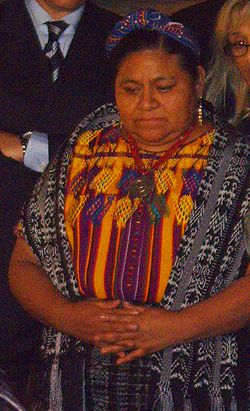 |
Guatemala Guatemala Guatemala is a country in Central America bordered by Mexico to the north and west, the Pacific Ocean to the southwest, Belize to the northeast, the Caribbean to the east, and Honduras and El Salvador to the southeast... |
Peace | "in recognition of her work for social justice and ethno-cultural reconciliation based on respect for the rights of indigenous peoples" | |
| 1993 | 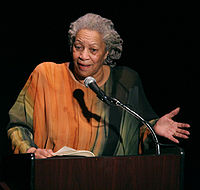 |
United States United States The United States of America is a federal constitutional republic comprising fifty states and a federal district... |
Literature | "who in novels characterized by visionary force and poetic import, gives life to an essential aspect of American reality" | |
| 1995 | 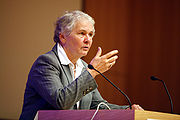 |
(shared with Edward B. Lewis Edward B. Lewis - External links :* *... and Eric F. Wieschaus Eric F. Wieschaus -External links:***, excellent profile**... ) |
Germany Germany Germany , officially the Federal Republic of Germany , is a federal parliamentary republic in Europe. The country consists of 16 states while the capital and largest city is Berlin. Germany covers an area of 357,021 km2 and has a largely temperate seasonal climate... |
Physiology or Medicine | "for their discoveries concerning the genetic control of early embryonic development Embryogenesis Embryogenesis is the process by which the embryo is formed and develops, until it develops into a fetus.Embryogenesis starts with the fertilization of the ovum by sperm. The fertilized ovum is referred to as a zygote... " |
| 1996 |  |
Poland Poland Poland , officially the Republic of Poland , is a country in Central Europe bordered by Germany to the west; the Czech Republic and Slovakia to the south; Ukraine, Belarus and Lithuania to the east; and the Baltic Sea and Kaliningrad Oblast, a Russian exclave, to the north... |
Literature | "for poetry that with ironic precision allows the historical and biological context to come to light in fragments of human reality" | |
| 1997 |  |
(shared with the International Campaign to Ban Landmines International Campaign to Ban Landmines The International Campaign to Ban Landmines is a coalition of non-governmental organizations working for a world free of anti-personnel landmines and cluster munitions, where mine and cluster munitions survivors see their rights respected and can lead fulfilling lives.The coalition was formed in... ) |
United States United States The United States of America is a federal constitutional republic comprising fifty states and a federal district... |
Peace | "for their work for the banning and clearing of anti-personnel mines" |
| 2003 | 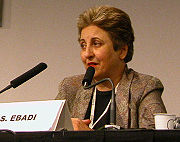 |
Iran Iran Iran , officially the Islamic Republic of Iran , is a country in Southern and Western Asia. The name "Iran" has been in use natively since the Sassanian era and came into use internationally in 1935, before which the country was known to the Western world as Persia... |
Peace | "for her efforts for democracy and human rights. She has focused especially on the struggle for the rights of women and children" | |
| 2004 | 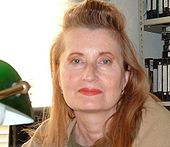 |
Austria Austria Austria , officially the Republic of Austria , is a landlocked country of roughly 8.4 million people in Central Europe. It is bordered by the Czech Republic and Germany to the north, Slovakia and Hungary to the east, Slovenia and Italy to the south, and Switzerland and Liechtenstein to the... |
Literature | "for her musical flow of voices and counter-voices in novels and plays that with extraordinary linguistic zeal reveal the absurdity of society's clichés and their subjugating power" | |
| 2004 | Kenya Kenya Kenya , officially known as the Republic of Kenya, is a country in East Africa that lies on the equator, with the Indian Ocean to its south-east... |
Peace | "for her contribution to sustainable development, democracy and peace" | ||
| 2004 |  |
(shared with Richard Axel Richard Axel Richard Axel is an American neuroscientist whose work on the olfactory system won him and Linda B. Buck, a former post-doctoral scientist in his research group, the Nobel Prize in Physiology or Medicine in 2004.... ) |
United States United States The United States of America is a federal constitutional republic comprising fifty states and a federal district... |
Physiology or Medicine | "for their discoveries of odorant receptor Olfactory receptor Olfactory receptors expressed in the cell membranes of olfactory receptor neurons are responsible for the detection of odor molecules. Activated olfactory receptors are the initial player in a signal transduction cascade which ultimately produces a nerve impulse which is transmitted to the brain... s and the organization of the olfactory system Olfactory system The olfactory system is the sensory system used for olfaction, or the sense of smell. Most mammals and reptiles have two distinct parts to their olfactory system: a main olfactory system and an accessory olfactory system. The main olfactory system detects volatile, airborne substances, while the... " |
| 2007 | .jpg) |
United Kingdom United Kingdom The United Kingdom of Great Britain and Northern IrelandIn the United Kingdom and Dependencies, other languages have been officially recognised as legitimate autochthonous languages under the European Charter for Regional or Minority Languages... |
Literature | "that epicist of the female experience, who with scepticism, fire and visionary power has subjected a divided civilisation to scrutiny" | |
| 2008 |  |
(shared with Harald zur Hausen Harald zur Hausen Harald zur Hausen is a German virologist and professor emeritus. He has done research on cancer of the cervix, where he discovered the role of papilloma viruses, for which he received the Nobel Prize in Physiology or Medicine 2008.-Biography:Zur Hausen was born in Gelsenkirchen, Germany, went to... and Luc Montagnier Luc Montagnier Luc Antoine Montagnier is a French virologist and joint recipient with Françoise Barré-Sinoussi and Harald zur Hausen of the 2008 Nobel Prize in Physiology or Medicine, for his discovery of the human immunodeficiency virus... ) |
France France The French Republic , The French Republic , The French Republic , (commonly known as France , is a unitary semi-presidential republic in Western Europe with several overseas territories and islands located on other continents and in the Indian, Pacific, and Atlantic oceans. Metropolitan France... |
Physiology or Medicine | "for their discovery of human immunodeficiency virus HIV Human immunodeficiency virus is a lentivirus that causes acquired immunodeficiency syndrome , a condition in humans in which progressive failure of the immune system allows life-threatening opportunistic infections and cancers to thrive... " |
| 2009 | 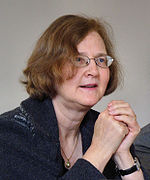 |
(shared with Carol W. Greider Carol W. Greider Carolyn Widney "Carol" Greider is an American molecular biologist. She is Daniel Nathans Professor and Director of Molecular Biology and Genetics at Johns Hopkins University. She discovered the enzyme telomerase in 1984, when she was a graduate student of Elizabeth Blackburn at the University of... and Jack W. Szostak Jack W. Szostak Jack William Szostak is a Canadian American biologist of Polish British descent and Professor of Genetics at Harvard Medical School and Alexander Rich Distinguished Investigator at Massachusetts General Hospital, Boston. He was awarded the 2009 Nobel Prize for Physiology or Medicine, along with... ) |
Australia Australia Australia , officially the Commonwealth of Australia, is a country in the Southern Hemisphere comprising the mainland of the Australian continent, the island of Tasmania, and numerous smaller islands in the Indian and Pacific Oceans. It is the world's sixth-largest country by total area... and United States United States The United States of America is a federal constitutional republic comprising fifty states and a federal district... |
Physiology or Medicine | "for the discovery of how chromosomes are protected by telomeres and the enzyme telomerase" |
| 2009 | 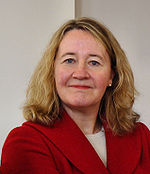 |
(shared with Elizabeth Blackburn Elizabeth Blackburn Elizabeth Helen Blackburn, AC, FRS is an Australian-born American biological researcher at the University of California, San Francisco, who studies the telomere, a structure at the end of chromosomes that protects the chromosome. Blackburn co-discovered telomerase, the enzyme that replenishes the... and Jack W. Szostak Jack W. Szostak Jack William Szostak is a Canadian American biologist of Polish British descent and Professor of Genetics at Harvard Medical School and Alexander Rich Distinguished Investigator at Massachusetts General Hospital, Boston. He was awarded the 2009 Nobel Prize for Physiology or Medicine, along with... ) |
United States United States The United States of America is a federal constitutional republic comprising fifty states and a federal district... |
Physiology or Medicine | "for the discovery of how chromosomes are protected by telomeres and the enzyme telomerase" |
| 2009 | (shared with Venkatraman Ramakrishnan and Thomas A. Steitz Thomas A. Steitz -Publications:* Steitz, T. A., et al. , nsls newsletter, .* Steitz, T. A., et al. , NSLS Activity Report .-External links:* , from the Office of Scientific and Technical Information, United States Department of Energy... ) |
Israel Israel The State of Israel is a parliamentary republic located in the Middle East, along the eastern shore of the Mediterranean Sea... |
Chemistry | "for studies of the structure and function of the ribosome" | |
| 2009 | Germany Germany Germany , officially the Federal Republic of Germany , is a federal parliamentary republic in Europe. The country consists of 16 states while the capital and largest city is Berlin. Germany covers an area of 357,021 km2 and has a largely temperate seasonal climate... and Romania Romania Romania is a country located at the crossroads of Central and Southeastern Europe, on the Lower Danube, within and outside the Carpathian arch, bordering on the Black Sea... |
Literature | "who, with the concentration of poetry and the frankness of prose, depicts the landscape of the dispossessed" | ||
| 2009 | (shared with Oliver E. Williamson Oliver E. Williamson Oliver Eaton Williamson is an American economist, professor at the University of California, Berkeley and recipient of the Nobel Memorial Prize in Economic Sciences.... ) |
United States United States The United States of America is a federal constitutional republic comprising fifty states and a federal district... |
Economics | "for her analysis of economic governance, especially the commons" | |
| 2011 | Ellen Johnson Sirleaf | Liberia | Peace Nobel Peace Prize The Nobel Peace Prize is one of the five Nobel Prizes bequeathed by the Swedish industrialist and inventor Alfred Nobel.-Background:According to Nobel's will, the Peace Prize shall be awarded to the person who... |
"For their non-violent struggle for the safety of women and for women's rights Women's rights Women's rights are entitlements and freedoms claimed for women and girls of all ages in many societies.In some places these rights are institutionalized or supported by law, local custom, and behaviour, whereas in others they may be ignored or suppressed... to full participation in peace-building work" |
|
| Leymah Gbowee Leymah Gbowee Leymah Roberta Gbowee is a Liberian peace activist responsible for leading a women's peace movement that brought an end to the Second Liberian Civil War in 2003. This led to the election of Ellen Johnson Sirleaf in Liberia, the first African nation with a female president... |
|||||
| Tawakel Karman Tawakel Karman Tawakel Karman became the international public face of the 2011 Yemeni uprising that is part of the Arab Spring uprisings... |
Yemen |

